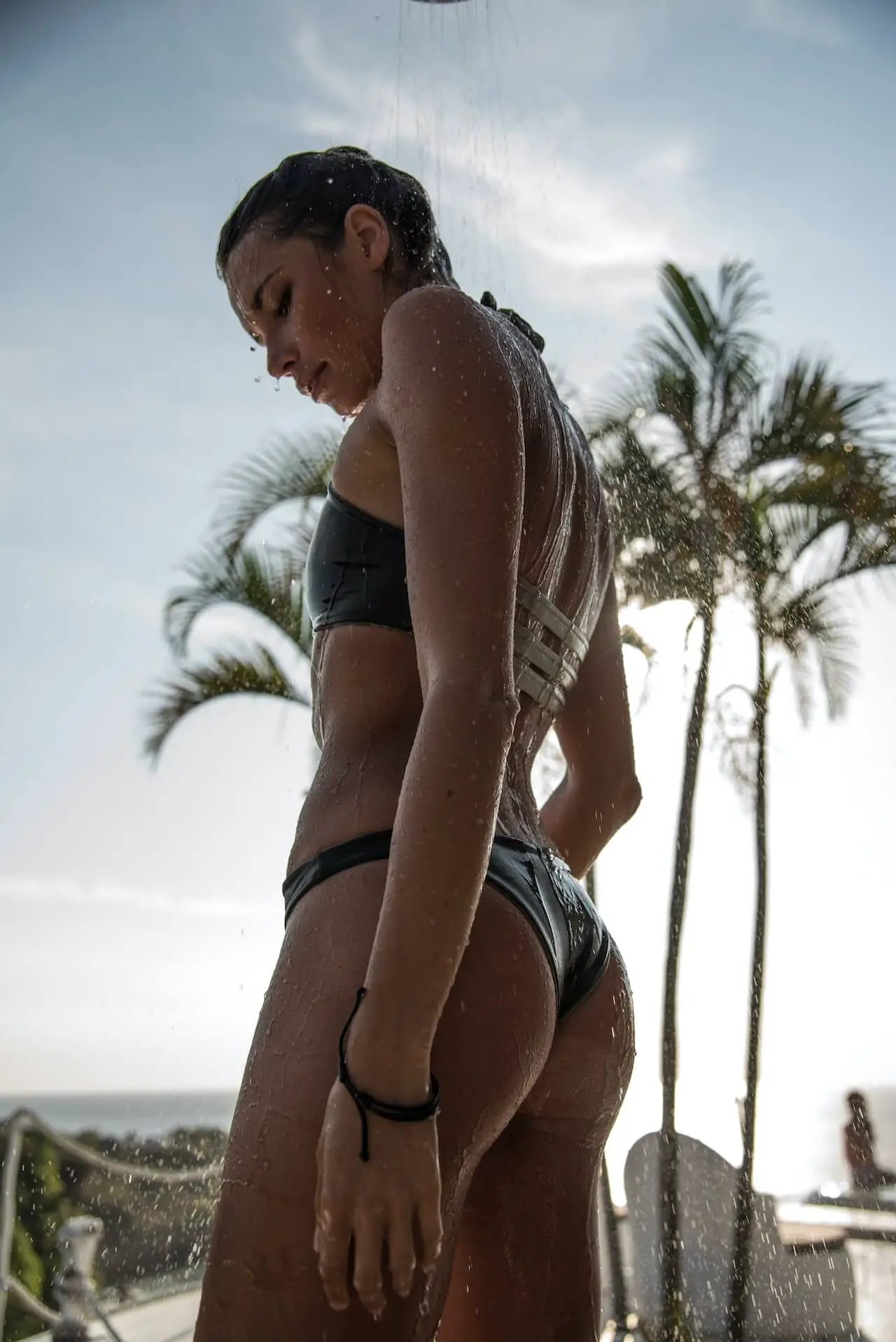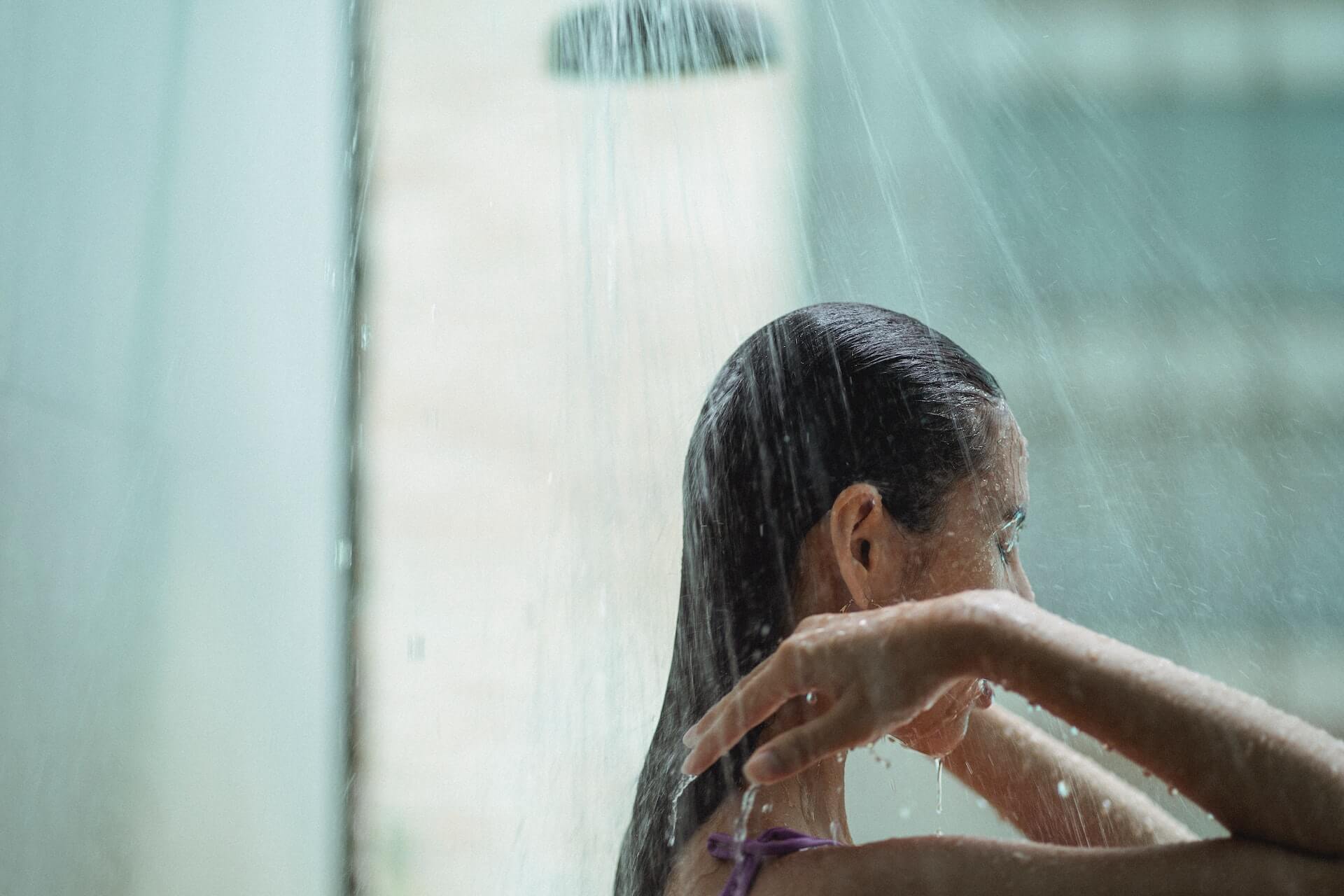Have you ever wondered if you should shower after being exposed to chlorine? Well, you’re not alone. Even though chlorine is widely used in swimming pools to keep them clean and safe by killing harmful bacteria and germs, the same chemical can have negative effects on your skin and hair if not washed off properly.

Showering after swimming is necessary to remove chlorine residue from your skin and hair. Prolonged exposure to chlorine can lead to skin dryness, itchiness, irritation, and hair damage. Showering removes chlorine and also helps maintain your skin’s natural oils and hydration. Using specialized products such as chlorine-removal shampoos and moisturizing body washes can further reduce the harmful effects of chlorine.
In this article, we’ll go over the benefits of showering after swimming and using specialized products to remove the chlorine effectively.
Negative Effects of Chlorine on Skin and Hair
Skin Dryness and Irritation
Frequent exposure to chlorinated water can lead to dry and itchy skin, especially if you swim for extended periods or often. To lessen the impact of this side effect, there are steps you should follow to protect your skin and hair.
After swimming, make sure to shower immediately to rinse off the chlorine from your skin using freshwater. You should use chlorine-removal shampoo to get chlorine out of your hair, and moisturizing body wash to ensure your skin stays supple and hydrated.
Hair Damage
Swimming in chlorinated pools can also have adverse effects on your hair. Regular exposure to chlorine can cause hair discoloration, dryness, brittleness, frizziness, lack of shine, and even weakening.
To protect your hair, wet it entirely in the shower before jumping into the pool – wet hair is less likely to absorb chlorinated water than dry locks. Additionally, showering after swimming helps to wash off the chlorine, thus reducing the risk of hair damage.
Benefits of Showering After Swimming

Removing Chlorine Residue
One of the primary benefits of showering after swimming in a chlorinated pool is to remove chlorine residue from your skin and hair.
Rinsing off with warm, soapy water helps to wash away the chemical, which can not only cause skin irritations but also contribute to the wear and tear of your swimsuits.
So, when you hit the showers post-swim, you’re not only doing your body a favor but also preserving the life of your swimwear.
Preventing Skin and Hair Issues
Showering after swimming helps to prevent skin irritations and hair damage caused by chlorine. Keeping chlorine on your skin can lead to issues such as eczema flare-ups and chlorine rash, while not rinsing it out of your hair can result in dry, brittle strands.
When you shower after swimming, you ensure that all remnants of chlorine are washed away, reducing the risk of these unpleasant side effects.
Moreover, making sure to shower after swimming helps keep your skin’s natural balance; prolonged exposure to chlorine can lead to dry skin, while getting rid of it promptly can help maintain your skin’s natural oils and hydration.
So, next time you go for a swim, make sure to follow it up with a shower to keep both your skin and hair healthy.
Showering Tips for Swimmers
Using the Right Hair Products
Chlorine can have negative effects on your hair, making it dry and brittle. To minimize these effects, make sure to use shampoos and conditioners specially formulated for swimmers. These products are designed to break the chlorine bond and gently wash away chlorine from your hair.
Additionally, consider using a leave-in conditioner to provide extra hydration and protection against the harsh effects of chlorine. When possible, always wear a swim cap to protect your hair from direct contact with pool water.
Optionally, you can apply some hair oil to add an extra layer of protection for your hair against chlorinated water. You can use hair oil prior to wearing the swim cap for protection while swimming, as well as after swimming and showering, where you can apply hair oil again to restore the protective layer again.
Taking Care of Your Skin and Hair
As you are hopefully starting to understand, showering is crucial after swimming in chlorinated water. Rinsing off with warm, soapy water helps to remove chlorine, chemicals, and any harmful bacteria that may have attached to your skin.
By showering for even just one minute, and even with just freshwater, you can remove most of the dirt or anything else on your body that uses up chlorine or bromine needed to kill or inactivate germs. But you can do even better than that with the right products.
To take great care of your skin, make sure to use a mild body wash that is specifically formulated for swimmers. These products are designed to break the chlorine bond and gently wash away chlorine from your skin. After showering, use a hydrating body lotion to help soothe and moisturize your skin, as chlorine may cause dryness or irritation.
Additional Precautions
Taking a shower after swimming in a chlorinated pool is a great way to remove chlorine from your skin, as it can cause dryness and itchiness. However, there are additional precautions you can take to protect your skin and ensure a comfortable swimming experience.
Pre-swim skincare routine: Before diving in, apply a barrier cream to your skin. This helps minimize the direct impact of chlorine on your skin by providing an extra layer of protection. Dermatologists recommend using a cream that is water-resistant and formulated for sensitive skin.
Wear a swim cap: Protect your hair from the drying effects of chlorine by wearing a swim cap. This can prevent your hair from becoming damaged or discolored, especially if you swim frequently.
Hydrate: Make sure you drink plenty of water before, during, and after your swim. Staying hydrated helps maintain your skin’s moisture levels, which can help combat the drying effects of chlorine.
Check the chlorine levels: You can find test strips at your local pool supply store or online. These little strips can help you determine the free chlorine levels in the pool, which should be at least 1 part per million (ppm) to ensure proper disinfection.
Frequently Asked Questions
How long after swimming can I wait to shower?
There isn’t a specific time limit, but it’s best to shower as soon as possible after swimming in a chlorinated pool. All pools will have showers available, as it is also recommended that you rinse yourself before even entering the pool. Showering afterwards can help to remove the chlorine from your skin and hair before it dries and potentially causes irritation.
Is it necessary to use a specific type of soap or shampoo to remove chlorine?
While regular soap and shampoo can help to some extent, using a specialized swimmer’s body wash or shampoo specifically designed to neutralize and remove chlorine from your skin and hair can be more effective. These products contain ingredients that break the bond between chlorine and your skin, making it easier to rinse away. These products are readily available online, at most department stores, and at swim shops.
What will happen if I don’t shower post-swim?
If you don’t shower after swimming in a chlorinated pool, the remaining chlorine on your skin and hair may cause irritation, dryness, and even skin rashes or other issues. It’s important to remove chlorine as soon as possible to avoid these negative effects.
Are showers needed after saltwater swimming?
While saltwater doesn’t contain chlorine, it’s still a good idea to shower after swimming in the ocean. Saltwater can dry out your skin and hair, and rinsing off sand and any potential contaminants or microorganisms in the water will help keep your skin healthy and clean.
Do I need to shampoo my hair after swimming?
Yes, it’s a good idea to shampoo your hair after swimming, particularly in a chlorinated pool. This helps to remove any chlorine build-up that can damage your hair, potentially making it dry, brittle, and prone to breakage. Using a swimmer’s shampoo can be especially helpful in neutralizing and removing chlorine from your hair.
Does the time spent in the pool affect how much chlorine stays on my skin or hair?
The longer you spend in a chlorinated pool, the more chlorine your skin and hair will absorb. Therefore, minimizing your time in the pool or taking breaks to rinse off can help reduce the amount of chlorine that stays on your skin and hair. But regardless of the time spent in the pool, it’s always important to shower afterward to remove any lingering chlorine.
Sources:
- https://www.everydayhealth.com/healthy-living/weird-things-chlorine-does-to-your-body-and-what-to-do-about-it/
- https://doctor.ndtv.com/living-healthy/here-s-what-you-can-do-pre-and-post-swimming-to-combat-the-effects-of-chlorine-on-skin-and-hair-2861890
- https://www.poolmagazine.com/pool-news/pool-hygiene-should-you-shower-after-swimming-in-the-pool/
- https://balmonds.com/blogs/blog/p-strong-should-you-shower-after-swimming
- https://www.cdc.gov/healthywater/swimming/swimmers/steps-healthy-swimming.html
- https://www.dermstore.com/blog/skin-care-for-swimmers/
